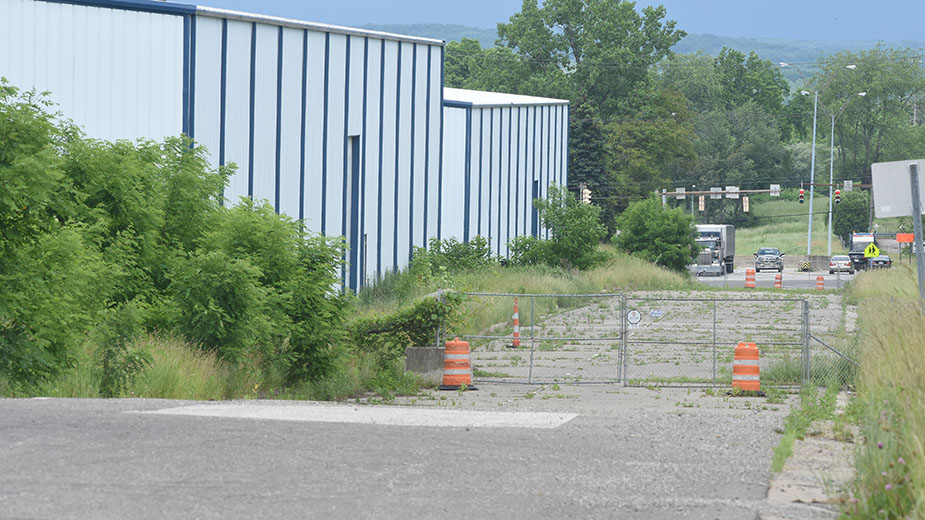YOUNGSTOWN, Ohio – His newsletters advertised “high ethical standards of truth and honesty.” Indeed, these brochures went as far as appropriating an image of Abraham Lincoln in the top right hand corner attesting to the character of Garry N. Savage Sr. as a “moral and ethical financial planner.”
As of June 6, Savage sat in the Erie County lockup awaiting release on bond, accused by the state of Ohio of swindling more than a dozen investors out of hundreds of thousands of dollars related to the stagnant Chill-Can project on Youngstown’s east side.
Savage, 78, was indicted in November by an Erie County grand jury on 86 felony charges. The state alleges he defrauded 13 Ohio residents via an investment scheme through his company, Coast to Coast Chill Inc., a Nevada corporation.
Savage has pleaded not guilty.
The government alleges that Savage sold investments to Ohio clients between July 2016 and February 2019 and was to invest the money in California-based Joseph Co. International. The money was to go toward the Joseph Co.’s construction of a Chill-Can campus on the East Side of Youngstown that would produce the world’s first self-chilling can and establish a research and development division for other cooling technology.
Instead, “investors’ funds were misappropriated,” according to a statement from the Division of Securities of the Ohio Department of Commerce.
“I’m 100% confident the money is gone,” says Peter Mozina, a Wisconsin resident whose elderly uncle, Jacob Berg, invested $382,000 with Savage in Coast to Coast Chill. Berg’s claim is not a party in the Ohio indictment.
Mozina says his 92-year-old uncle first met Savage in Florida around 2017, where Savage operated a brokerage firm. His uncle invested the money in a self-directed IRA through Savage with Westlake-based Equity Trust as its custodian.
Efforts to recoup the money from Equity Trust have been unsuccessful, Mozina says, since Equity has told him the money would need to be released from Savage before it could be dispersed.
“The only person who is going to give it back to us is Garry Savage,” Mozina says. “And he’s been indicted. I believe my uncle will get nothing out of this.”
Meanwhile, the city of Youngstown continues its fight with the developer of Chill-Can, Joseph Co. International CEO Mitchell Joseph. Youngstown claims a subsidiary of the company defaulted on two agreements it signed in 2017 that promised 237 jobs in exchange for city incentives.
Today, high weeds obscure the signage of the Joseph Co. at the entrance to the Chill-Can site. A tattered U.S. flag flies overhead. Three buildings sit empty on the 21-acre lot. Not a single can has been produced and few employees have been hired since ground was broken on the project in November 2016.
The Joseph Co. is now embroiled in litigation with the city, which anted up $1.5 million in development grants and racked up $600,000 worth of demolition and abatement costs to prepare the site. The city is seeking $2.8 million in damages and the return of the land from M.J. Joseph Development Corp., a subsidiary of Joseph Co. International. M.J. Joseph has argued that the city does not have the right to reclaim any money or land, per the language of the agreements.
A SUBPLOT THICKENS
The Business Journal first reported in August 2020 that Savage, then a former investment broker whose license was permanently suspended in 2019 for violating Ohio securities laws, was among the early investors in the Chill-Can project.
Savage and the Joseph Co. began doing business together in 2016, when Savage signed contracts where he agreed to pay $7.5 million for Chill-Can rights to the Ohio territory and another $5.8 million for Florida, according to documents obtained by The Business Journal. The Joseph Co. sued Savage in August 2017, however, alleging breach of contract. The matter was settled and terms of the settlement were not disclosed.
Yet in 2020, Savage told The Business Journal that he would “take over the whole financing part for the Joseph Co.,” insisting that he owned a stake in Youngstown and rights to a potential expansion in Florida.
At the time, the discredited broker said that his charge was to raise the money necessary to finish these projects. Savage said Coast to Coast spent approximately $5 million for Chill-Can rights, asserting he also held royalty rights to every chill-can sold worldwide.
“The money going into the Youngstown plant is mine – it’s always been mine,” he said.
Savage then asserted that he could secure additional investment to finish the Youngstown plant, start another operation near Miami, and then begin work on a third plant in Iowa.
But Joseph Co. Chairman and CEO Mitchell Joseph told The Business Journal at the same time that Savage held no financial interest in the Youngstown project, just the Florida license. “That is his only licensee relationship with the Joseph Co.,” he said. He also emphasized the company had “zero” plans for a plant in Iowa.
BIG PROMISES OF BIG RETURNS
Savage began to solicit investors for Coast to Coast Chill as early as July 2016 and at least until February of 2019, according to the Ohio indictment. However, some of Savage’s clients were also cultivated in Florida, where he owns a residence in Naples.
According to a court complaint filed in Collier County, Florida, Savage participated in seminars where he would introduce himself to attendees “in order to try and sell them high commission, high risk ‘investments.’ ” Among those investment opportunities was Coast to Coast Chill, documents show.
The complaint, filed in September 2021, by Denise Brunal-Hicks against Savage and two other associates, alleges that Savage sold at least four investment products to her late parents, among them a $250,000 stake in Coast to Coast Chill. At the time of the sale, the complaint says, Brunal-Hicks’ father was more than 90 years old and her mother was over 80 and suffering from dementia.

Once her parents had died, Brunal-Hicks contacted Savage about these investments, court papers say, and Savage assured her they “were sound.”
According to the complaint, Savage “misrepresented to plaintiff that these investments would grow in value at 20% annually” and that Chill-Can royalties would be paid, despite the setbacks in Youngstown.
The complaint further alleges that Savage “falsely claimed that he and/or Coast to Coast Chill owns the rights to receive royalty payments on Chill Cans sold in Florida and Ohio.”
Joseph Co. “confirms that neither defendant Savage Sr., or Coast to Coast own any royalty rights in connection with the Chill-Can,” court documents say.
On May 18, 2022, the parties reached a settlement. Its terms were not disclosed.
PROMISES, PROMISES
Investors in Coast to Coast were to receive semi-regular updates from Savage about the progress of the Youngstown plant while also hyping the prospects of the Chill-Can, according to documents obtained by The Business Journal.
A letter dated June 21, 2019, that Savage signed to an investor, for example, boasts that Coast to Coast had secured to date “about $10 million of a $12 million total equity raise.” The Youngstown project, Savage wrote, could earn Coast to Coast approximately $10 million per year in royalties based on Joseph Co. International’s projections of producing one billion cans annually from the site. Once operations in Youngstown ramped up to a sufficient level, “Income distributions would start to be made toward shareholders,” he writes in the letter.
Savage’s letter states that more than 400 patents the Joseph Co. owns on self-chilling technology, and valued at $1 billion, protected shareholders. The company owns a manufacturing and distribution plant in Irvine, California, as well as a plastics-injection molding operation, SI Protech, based in Littlehampton, United Kingdom.
As late as Feb. 25, 2020, Savage continued to make assertions that his clients would begin to see royalty payments soon.
“We are now close to opening the plant for production,” Savage wrote to investors regarding the Youngstown plant. “I have requested that our first royalty checks come from prior sales. Once the funds are dispersed to me, I will pay royalties to ALL shareholders.”
In reality, the Youngstown campus was far from finished and ready for production. Two years ago, just two buildings stood at the site, one of which Savage deemed “complete” and the other he described as “fully erected.” While the first building contained lockers, an office area and bathrooms, the second building was a mere shell without a concrete floor. Footers for a third building were just being installed.
“Mitchell [Joseph] expects Coast to Coast to start royalty checks in late fall early winter with the earliest being late summer,” Savage’s letter says. “Larger royalty checks will start coming in early 2021.”
ARREST AND IMPACT ON YOUNGSTOWN PLANT
Savage, who has another residence in Huron, Ohio, was indicted Nov. 9, 2021, by an Erie County grand jury and arrested in Florida, April 14, records show. He was extradited and booked into Erie County jail on May 16, according to records.
Savage’s bond was reduced from nearly $2.4 million to $100,000 and he was to be released under electronic monitoring during the week of June 6, court documents state.
The state lists Savage as being charged with 18 counts of false representations in the sale of securities, 18 counts of securities fraud, 21 counts of fraudulent, deceptive, or manipulative conduct as an investment adviser, 18 counts of unregistered securities, four counts of theft from a person in a protected class, three counts of grand theft and four counts of aggravated theft.
A trial is set for Jan 24, 2023.
Calls and emails to Savage’s attorney, Kenneth Bailey, seeking comment were not returned.
Bailey, however, told the Sandusky Register last month that his client did turn investors’ money over to the Joseph Co.
“Mr. Savage provided $10 million to the historically successful Joseph Company International Inc., which has failed to produce any return on investment to Mr. Savage’s investors,” the newspaper quoted Bailey as saying. “We sympathize with (investors’) frustrations, but this is a civil matter, at best.”
Brian Kopp, the attorney representing the Joseph Co. subsidiary in the Youngstown project, M.J. Joseph Development, did not return emails seeking comment.
Meanwhile, the city is unsure as to how the Savage case will affect its own legal entanglement with Mitchell Joseph and M.J. Joseph Development over the Youngstown site.
“This has to be something of a factor but we just don’t know yet,” says Jeff Limbian, city law director.
“We don’t know the breadth of it.”
Joseph has made a “strong implication” that there is no longer a connection between the Joseph Co. and Savage, Limbian says. The law director says the city has been unable to conduct depositions in the case to verify the claim.
Meantime, the city is preparing for a hearing July 1 in Mahoning County Common Pleas Judge Maureen Sweeney’s court on motions it filed.
In February, the city asked the court to impose sanctions on M.J. Joseph Corp., saying it had failed to turn over documents as ordered by the court magistrate. The city says the company has not delivered documents showing all the expenses used for the Chill-Can site.
In April, Limbian told The Business Journal the objective is to build a full picture of the project, including a full accounting. “It seems he’s stonewalling at every turn. Hopefully the magistrate will see it our way and bring Mr. Joseph into compliance.”
Pictured at top: Three buildings sit empty at the weed-choked Chill-Can site on the east side of Youngstown.
